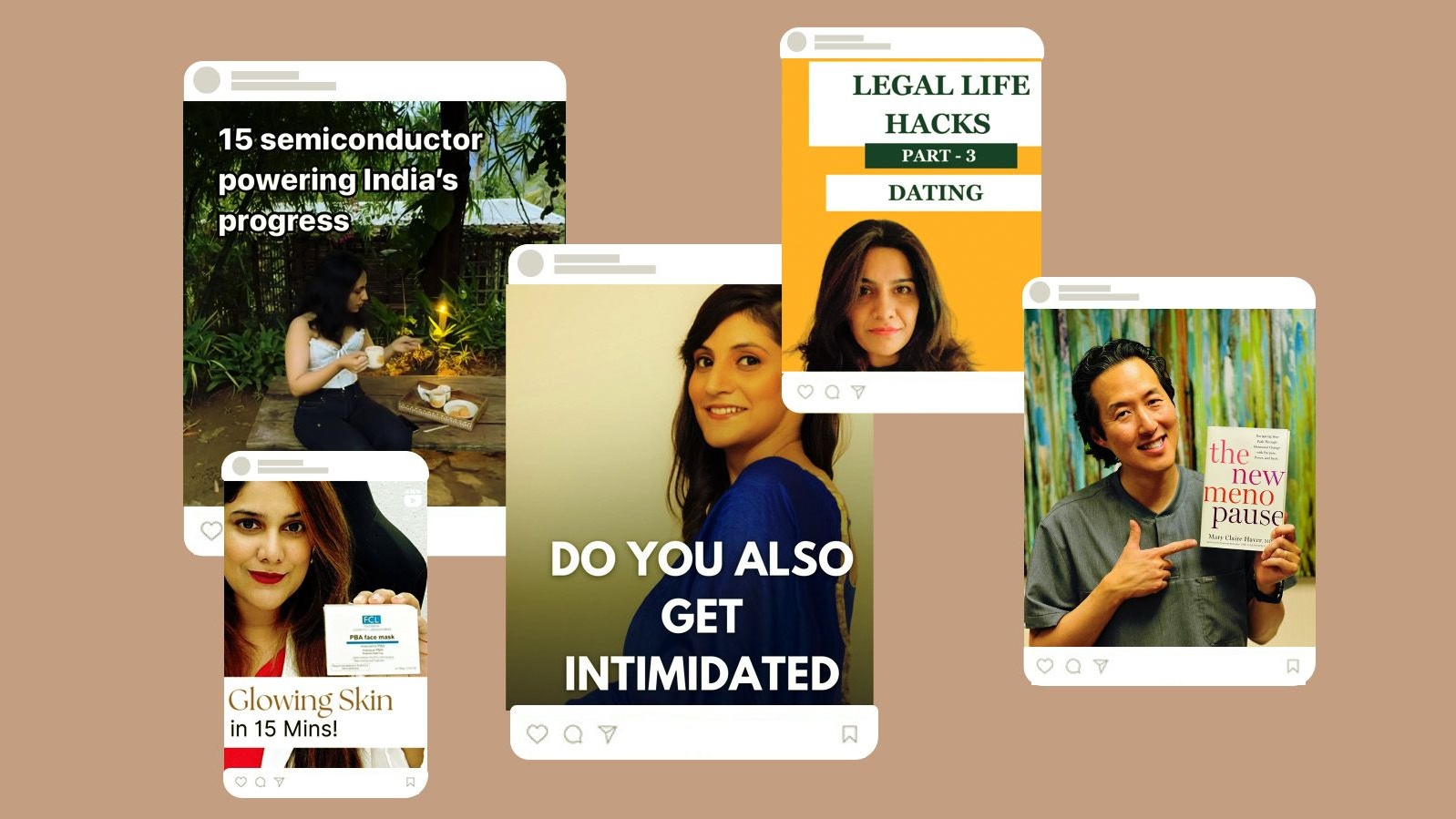Say what you will about the bane that is social media, but recently, my late-night doomscrolling feels a lot less doomed. Thanks to Instagram, I’m getting free expert advice from a spectrum of professionals: I’ve had a psychiatrist advise me on how to shake off my people-pleasing tendencies, a dermatologist recommend sunscreens that promise not to break me out, and a nutritionist share remedies for menstrual bloating. All in all, my algorithm is slowly doing away with make-up hauls and GRWM reels to feed me a rotating platter of content by those in ‘conventional’ careers—i.e. everyone from doctors and therapists to accountants and even lawyers.
Instagram’s visual storytelling capabilities have long appealed to those navigating a creative career, replacing the traditional ‘creative portfolio’ as we knew it. Writers flaunt their latest byline (guilty!), filmmakers use it as a reel, photographers and stylists use it to get visibility for future bookings, and artists these days land commissions via their DMs. For most creatives, shooting and editing aesthetically pleasing videos and churning out witty captions is a natural extension of the same skill set—but the same cannot be said about your local gynaecologist who is probably more comfortable delivering babies than navigating InShot.
So, what’s driving the rise of professionals, previously bound by a traditional 9-5, to flex their creative muscles online? For Jabalpur-based lawyer-turned-legal-influencer Tanya Appachu, the appeal is in the flexible hours that come with being an independent content creator. In 2021, her maternity leave was coming to an end, and she had little desire to go back to the taxing routine of a legal practice in the midst of an ongoing pandemic. Add to that the constant shuffling due to her husband’s army postings and the new responsibilities that come with starting a family. She was convinced that a law firm was no longer a fit—but how else could she leverage her background?
Three years later, Appachu caters to a whopping audience of 237K who generate organic word of mouth, landing her a regular roster of clients for online consultations. “Partly out of my own need to be connected to my profession and partly out of service to the society, I started a page called @yourinstalawyer that touches upon issues and topics that affect the layman. I discuss women’s rights, laws around abortion and health, cybercrime, employment policies—stuff that is relevant to everyone,” she shares. Months of learning the ins and outs of Canva and InShot through tutorials laid the foundation for her now-solid Instagram presence. It doubles up as a digital portfolio, boosting her credibility and giving her the freedom to continue a legal practice from any corner of the world, without compromising on being present for her daughter.
The new establishment
While content creation is an alternative career path for some, others see their online presence as a platform to gain visibility for their day job. Take 23-year-old Kritika Sharma, a full-time financial advisor based out of Gurgaon, who began posting informational content on private equity and venture capital earlier this year as a personal project—it was an attempt to educate the masses on the workings of the stock market. Her IG page, @sharmajiinvests, where she demystifies topics like seed funding, soon developed a following of nearly 80K, and caught the attention of fintech firms who routinely reach out to her with collaboration requests. What started off as a passion project soon became Sharma’s USP; one that she now leverages to distinguish herself from a sea of candidates. “There is so much competition right now in the country for the same kind of jobs. You have people who are overqualified and with decades of experience. How does one stand out? When you have a decent number of people following and listening to what you have to say online, it adds weight to your professional portfolio,” Sharma believes. “In my field, even those in leadership roles at top funds are moving towards podcasting or writing blogs and newsletters to create a personal brand.”
It doesn’t hurt to have some extra visibility, no matter which industry you’re in or how secure your job is. This shift is tangible even in the world of medicine, with doctors using social media to forge a strong individual identity, separate from the hospital they are affiliated with. “I think it's very essential today to market yourself because for a doctor, I am my own brand,” says Dr Sravya Tipirneni, a consulting dermatologist and cosmetologist at Manipal Hospital in Bengaluru. “When you’re a nobody, it obviously starts with the hospital name but eventually, you make your own name. That’s why, when doctors shift, the patients also shift with them.”
Dr Tipirneni acknowledges the effort it takes to develop an online following, a sentiment echoed in this article in The Ken that talks about the growing pressure on India’s newly graduated doctors to create and maintain a social media presence. Creators like Sachita Jasani, with their effortless Instagram face and strong visual aesthetic, set the standard for the kind of polished content viewers are used to consuming. A psychologist by training and health coach by profession, Jasani uses her platform filled with curated flat lay of food photos and outfit changes to offer DIY videos with her 19.5k followers that revolve around making healthier grocery and kitchen swaps to your diet. For her part, Dr Tipirneni outsources all the editing, posting, and admin to young social media mavens. She still has final say on the topics to tackle and the insights come from her directly depending on the sort of questions that slide into her DMs, but she delegates the social media heavy lifting to specialists, which allows her to focus on her core expertise.
Group therapy
An engaging online presence is not just about striking a chord with prospective clients, but also giving space to cement and nurture relationships with existing ones by creating an approachable online persona. As digital natives, it’s not unthinkable for Gen Z to hunt for their therapists on Instagram before booking an appointment—and in this case, a professional who has already put out a plethora of relatable content (‘how to spot red flags in a relationship’ or ‘build confidence at the workplace’) is going to have the upper hand. In the case of practitioner-creators like Divija Bhasin, whose Instagram following is nearing 300k, the comment section almost feels like a breakout group therapy session, with people sharing everything from their experiences with depression to their views on parenting. “Sharing relatable mental health insights on social media has also allowed clients to see a glimpse of who I am and my approach to therapy, which helps build trust and rapport even before the first session. We can show our human side, build credibility, and directly connect with people. It gives space for authenticity and education, which may not always be possible on a traditional platform like LinkedIn,” explains counselling psychologist Arouba Kabir, aka @mentalhealthcareist. Kabir is regularly approached by news and radio outlets such as ABP News and Red FM for her expert insights on navigating relationships and sex; PR that might have been more challenging to get if she wasn’t armed with her digital status.
Ultimately, conventional professionals have taken a leaf from the influencer playbook to carve out a more accessible version of themselves—and our Instagram feed has been getting a lot more interesting, as a result. In the age of misinformation that has unqualified strangers claiming to be health gurus, fitness coaches, finance specialists, and whatnot—maybe there is comfort to be found in consuming content by a certified professional who, by default, feels more reliable. Now excuse me while I stalk this orthopaedic who has some reassuring advice on dealing with my flat feet.






